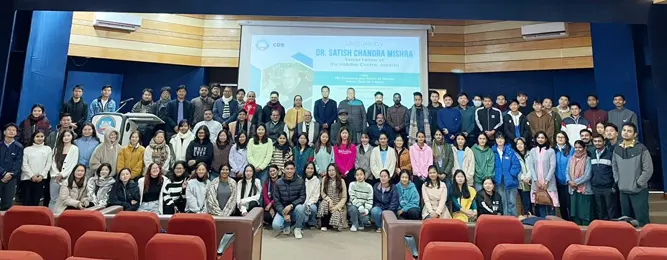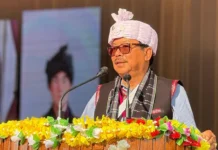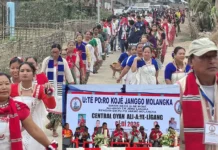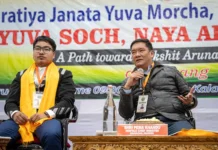RONO HILLS, 1 Feb: Rajiv Gandhi University’s (RGU) Centre for Development Studies (CDS) organised its 10th special lecture on 31 January on the Topic ‘The economics and politics of climate action: Time for a reset’, here on Wednesday.
Jakarta (Indonesia)-based Habibie Centre’s economist & policy adviser, Dr Satish Chandra Mishra, delivered a lecture on various issues related to “climate change and politics at the global level in climate change action,” the university informed in a release.
“There has been significant change in global climate after the industrial revolution in the 18th century. However, the climate change action has not been up to the mark at the global level,” Dr Mishra said, adding that “there is a need for ensuring climate change justice and inter-generational fairness for maintaining the wellbeing of vulnerable countries and future generation.”
Further, he argued that “there is a need to develop the sentiments of common humanity, as climate change is a common problem of entire humanity and it’s an existential threat.”
He suggested “resetting the climate change action, involving local communities, local governments and large organisations.”
Dr Mishra also clarified queries raised by the participating students and scholars with regard to the impact of artificial intelligence, the impact of climate change on island countries, and “the moral hazard involved in government support for pollution reduction to firms,” the release stated.
RGU Vice Chancellor Prof Saket Kushwaha expressed appreciation for the CDS for organising the lecture on such a relevant topic, and thanked Dr Mishra for visiting the university to deliver the lecture.
Expressing hope that the lecture would immensely benefit the students and scholars of RGU, he encouraged them to “take up research in such relevant areas.”
RGU Social Sciences Dean Prof SK Chaudhuri urged all to “contribute your part in mitigating climate change and environmental degradation,” while Economics HoD Prof SK Nayak said that climate change is a serious issue and needs to be addressed. Citing data, he informed that “there has been significant change in the climatic condition of Itanagar in the last 30 years.”
CDS coordinator Prof Vandana Upadhyay also spoke.
The lecture was attended by faculty members, research scholars and students of various departments of RGU.
In the afternoon, a roundtable discussion on the theme ‘Indonesia’s systematic transition and the lessons for the 21st century Asian resurgence’ was held in the economics department, during which Dr Mishra, addressing faculty members, students, and scholars of various departments, highlighted “the robust performance of Indonesian economy after its transition from military dictatorship to a democratic republic in 2000,” and added that “there is a need to understand the systematic transition of the Indonesian economy and build up strong ties among the ASEAN countries, thereby promoting faster economic growth of the region.”
The 11th lecture organised by the CDS was held on 1 February, on the topic ‘Poverty and inequality: Philosophy, policy and action’.
The lecture was again delivered by Dr Mishra, who highlighted the concept of poverty and methods of measuring poverty and inequality, the release stated.
“Poverty is a multidimensional concept and includes not only income, income assets and consumption, but also other dimensions like education and health,” Dr Mishra said, and added that “government assistance programmes are being implemented in various developing countries to help people to come out of poverty, but there is a need to make the programmes targetted for effective delivery and achieve desired outcomes.”
He further argued that, “to be non-poor and free from deprivation is a human right, and it is the responsibility of the state to ensure it.”
“With economic growth, poverty may go down, but it may not necessarily lead to decline in inequality,” he stated, and advocated initiating a “policy action to reduce inequality along with poverty, as inequality may lead to social and political unrest in the society.”
He urged the scholars to “use appropriate data and methodology in your research, and come out with specific and valuable policy implications.”
RGU Economics HoD Prof SK Nayak and CDS coordinator Prof Upadhyay also spoke.





